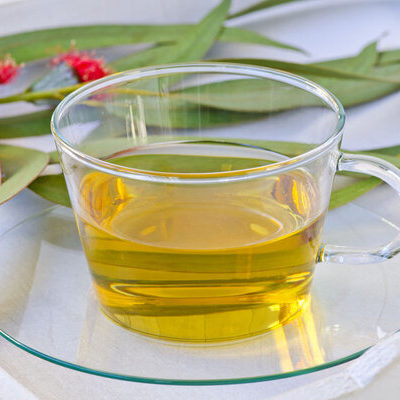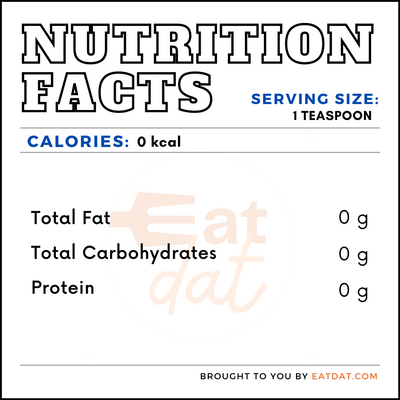
Eucalyptus Tea
What is Eucalyptus Tea?
Eucalyptus tea is an herbal tea made from eucalyptus leaves. The eucalyptus tree (Eucalyptus globulus) belongs to the Myrtaceae or myrtle family. Eucalyptus tea is known for its soothing effects and minty aroma.
- In the kitchen, these leaves are often used to infuse their strong mint flavor in jellies, cakes, and purees.
- Eucalyptus leaves also produce an essential oil that serves several purposes.
According to Healthline, some common uses for eucalyptus leaves are:
- Tea
- Aromatherapy
- Baths
- Bug repellent
- Topical treatments
Origin of eucalyptus tea
The general belief is that the eucalyptus tree and the majority of the species of this plant originated in Australia. The tree is common in many cultivated regions of Australia because it has adapted to various soils and climatic conditions. Researchers believe the tree found its way to nearby islands via land bridges. In the early 1600s, eucalyptus trees became well-known when the Portuguese occupied Timor, Northern Australia. It is also possible that eucalyptus seeds moved to Australia from Brazil, which was a Portuguese colony at that time.
In 1788, Charles-Louis L’Heritier mentioned eucalyptus in one of his writings, when describing a species found in Bruny Island, Southern Tasmania. In 1853, common eucalyptus reached the United States. For several years, it served as a source of timber and fuel in the US. Eucalyptus later became a popular ingredient in many over-the-counter products such as mouthwash and vapor rub. Today, this herbal tea remains a common way to use this plant’s natural benefits.
Function
Eucalyptus leaves have several useful functions. Eucalyptus foliage serves as an integral component in bath additives and herbal cold remedies. Furthermore, eucalyptus leaves produce an oil that may relieve arthritis and skin inflammation. This plant’s oil is also used in antiseptics and dental products.
Nutrition
A serving of 1 teaspoon of organic eucalyptus loose tea leaf contains:

Eucalyptus leaves are the primary component in making this tea. Some significant health benefits this drink can offer include:
- This tea may help you to maintain healthy teeth.
- It might be capable of reducing blood pressure and promoting relaxation.
- This tea might be able to relieve cold and asthma symptoms.
- It is rich in antioxidant compounds that can protect your body from free radical damage and oxidative stress.
This tea is generally considered safe for human consumption. However, it is risky to consume eucalyptus oil. This oil has a risk of toxicity, seizures, and lowered consciousness, especially in children.
Commercial production
Eucalyptus trees grow well in tropical to temperate climatic regions. An annual rainfall of 31.5 inches is perfect for this tree’s growth. Generally, this tree can survive under a wide range of climatic and soil conditions. Eucalyptus trees reach a height of 787.4 to 1968.5 inches and a diameter of about 79 inches.
The commercial production of eucalyptus tea first begins with collecting the tree’s leaves. Then, the leaves are sorted, washed, and disinfected. After that, the leaves are packaged for loose leaf tea or are sent off for further processing to prepare tea bags.
Application
It is easy to make eucalyptus tea at home. Simply, follow the steps below:
- First, pour dried, crushed the tea leaves into a teacup.
- Then, heat water till it begins to boil. When it is boiling, turn off the heat for a minute to reduce its temperature.
- Next, pour the water over the leaves. Six ounces of water is the ideal amount for one teaspoon of eucalyptus leaves.
- After that, allow the tea leaves to steep for as long as you want.
- Finally, strain the leaves and enjoy your eucalyptus tea.
Eucalyptus tea recipes
Eucalyptus leaves can be used in several foods and drinks. Some recipes to try include:
- Eucalyptus Tea
- Jasmine and Eucalyptus Tea
- Eucalyptus and Orange Smoothie
- Eucalyptus Pesto
- Eucalyptus Martini
FDA regulation
The Food and Drug Administration classifies eucalyptus as a food additive that is suitable for human consumption. It is to be used in the minimum quantity required for its intended use in any form (such as plant parts and oils). The body also recognizes eucalyptus oil as an active ingredient in cold, cough, and allergy drug products.
References
Frey, Malia. “Eucalyptus Tea Benefits and Side Effects.” www.verywellfit.com, Very Well Fit blog, 15 Sept. 2019, www.verywellfit.com/eucalyptus-tea-benefits-and-side-effects-4163892.
“CFR – Code of Federal Regulations Title 21.” accessdata.fda.gov, U.S. Food & Drug Administration, 1 Apr. 2019, www.accessdata.fda.gov/scripts/cdrh/cfdocs/cfcfr/CFRSearch.cfm?fr=172.510.
